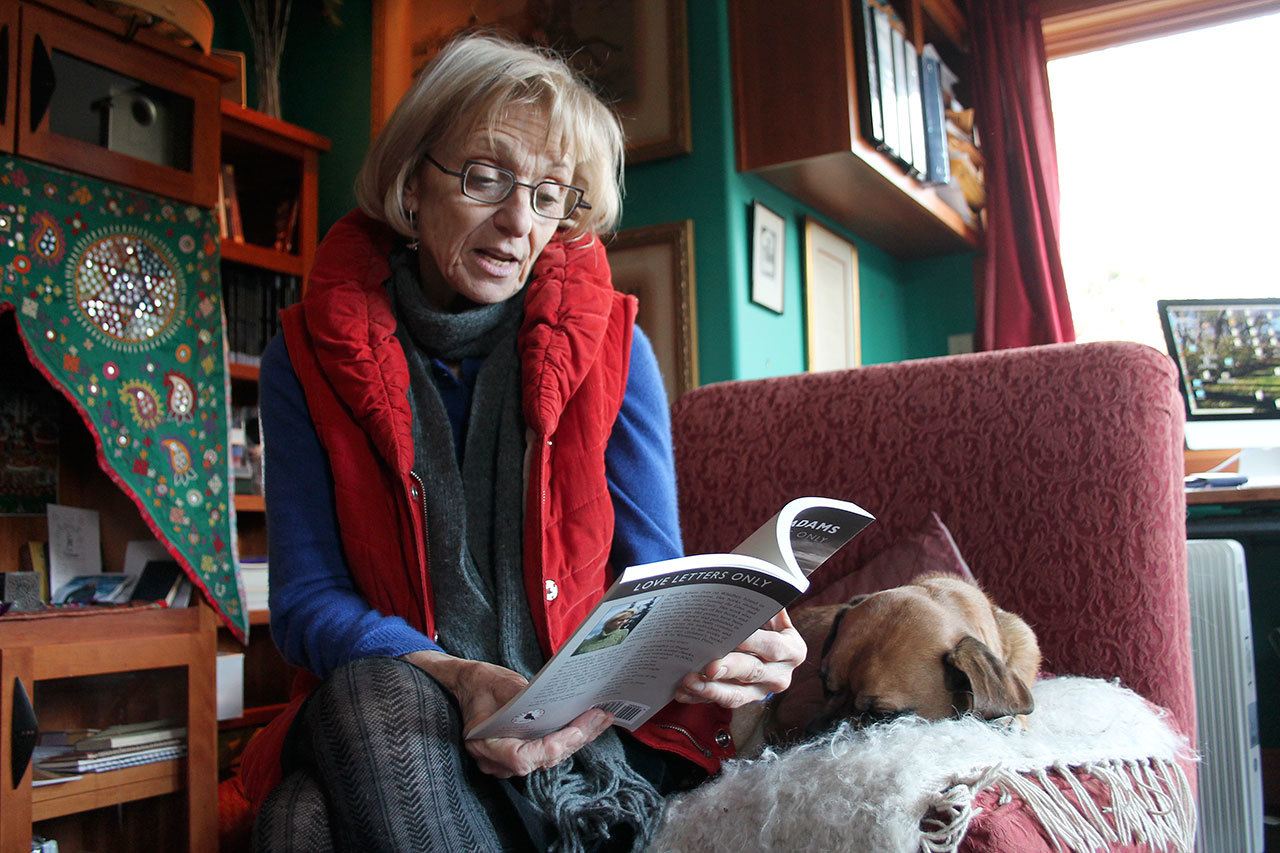It’s common to think poetry is pretentious, too obtuse or too cryptic.
But Judith Adams wants to put that right and show the average Joe that it can be accessible, and that everybody can “hear the music in poetry.”
“I want to get people who aren’t normally interested in poetry interested,” Adams said. “I think some poetry is inaccessible, and it shouldn’t be that way. We all have a little poet in us if it comes from the heart.”
The Langley-based poet will give a series of talks across the state over the next year discussing the craft, its importance and how it can potentially change lives. She’s touring the state after she was one of 31 people selected for the Humanities Washington Speakers Bureau earlier this year, which brings professors, artists, scholars and other people of interest to lead discussions in communities across Washington. The speakers bureau website describes the organization as “fascinating talks by fascinating people.”
The English-born poet will hold multiple discussions from Whidbey Island to Walla Walla. Her inaugural discussion, titled “A Fierce Language: Falling in Love with Poetry” was slated for Tuesday, Jan. 3 at Healing Circles in Langley, after The Record’s press time.
Adams is on a mission to give poetry to those whom she believes could use it as an outlet for self expression. As a former educator with Waldorf Schools, she came to the realization that poetry and nursery rhymes can be used as a tool to teach youth to think creatively for themselves from a young age. But knowing that poetry is also a therapeutic activity, Adams realized those who are suffering could also benefit from reciting and writing poetry. She currently leads poetry talks with grief groups, and is aiming to utilize her platform with the speakers bureau to bring spoken word to those on the fringes.
“What I asked to do with the speakers bureau is to go into prisons, because I used to work with lifers in a prison on the East Coast, and it was amazing to work with them,” Adams said. “I also want to go to other places where people are suffering or need an outlet, such as psychiatric hospitals and even high schools.”
Adams is fully aware that many were rubbed the wrong way by poetry somewhere down the line, most likely in high school while dissecting Shakespeare as a 15-year-old. But she wants to show the average person that poetry doesn’t have to be abstract, cryptic or overly literate. It can be simple, and it can be bad. But she says as long as it comes from the heart, it’s beneficial to put pen to paper.
“People have this hang up about not going to university and feeling you have to do that in order to enjoy these so called cerebral things,” Adams said. “But really, it’s about being human. Poetry touches the human spirit.”
To her point, Adams didn’t go to college. She doesn’t see herself as part of the well-read elite. But she’s been writing and performing her poetry for years now and has built up a following over the years. She often performs with accompanying music to set the mood at locations such as Whidbey Island Center for the Arts. Four books of her poetry have been published, and several albums of her spoken word poems have been recorded. Her passion for live poetry emanates from working in voice performance, and those skills have translated to her poetry talks.
“I always refer to her as the poet laureate of Langley,” friend and collaborator Peggy Taylor said. “Her poetry is so accessible to the average person and is so insightful. I’m glad she’s now on the speakers bureau because I’ve wished others could have the same experience of seeing her performances.”
Adams says her mission of bringing poetry to a wider audience has been successful here on South Whidbey. She says Whidbey has been “extremely receptive” to her work, and that nurturing atmosphere has allowed her writing to go from strength to strength. But she is now turning her attention elsewhere, since she recognizes not every community is as active in the arts.
But she thinks poetry’s popularity is gaining momentum. The internet has provided a platform for more poets to put their work out, and classic poets such as 13th century Persian poet Rumi have become more popular in recent years, she added. She believes the recent resurgence comes down to the realization that poetry isn’t just for “the liberal elite.” It’s a way to express one’s personal experiences and give readers something to relate to.
“For too many of us, we’ve lost that form of self-expression,” Taylor said. “I think it’s important for everyone to have that outlet, and people like Judith are encouraging others to make that outlet for themselves.”
To schedule a speakers bureau event with Adams, contact Humanities Washington Program Director Zaki Hamid at zaki@humanities.org.


